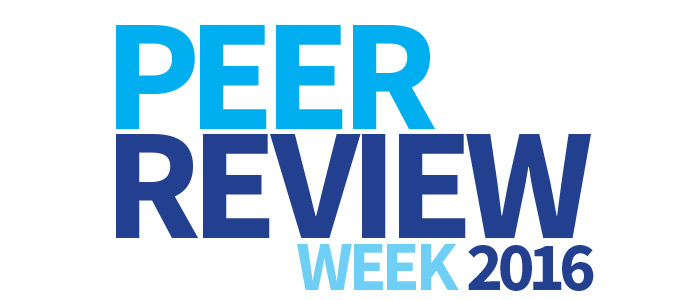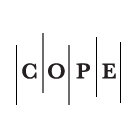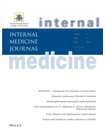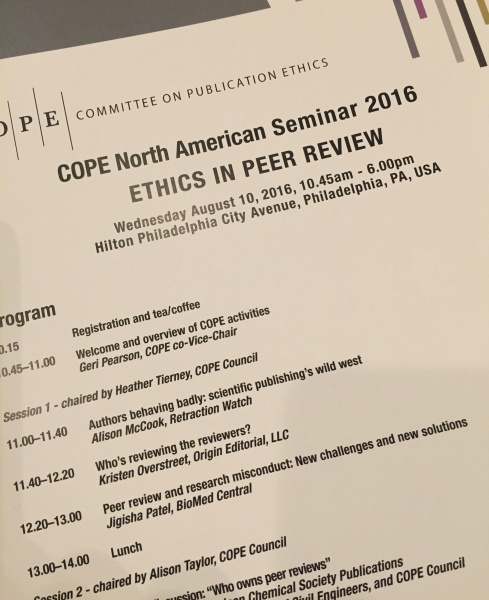 It’s Peer Review Week, where we celebrate how peer review helps maintain academic quality. Much of this month’s COPE Digest has been chosen to reflect just that, to share with you relevant insights from COPE members and the COPE team, and to give you the opportunity to contribute yourself. Please, dive in.
It’s Peer Review Week, where we celebrate how peer review helps maintain academic quality. Much of this month’s COPE Digest has been chosen to reflect just that, to share with you relevant insights from COPE members and the COPE team, and to give you the opportunity to contribute yourself. Please, dive in.
 This month… You can read and reflect on the recent meeting funded by US Office of Research Integrity, where delegates discussed prevention and management of misconduct related retractions under the theme “keeping the pool clean”. COPE’s reaction, and it’s not controversial, is that knowledgeable reviewers are at the heart of the careful processes that create reliable corrections. Our roundup of research and publication ethics news this month also provides reason to pause. This month, from among the headlines, we flag a new discussion about hypercompetition, one of the themes from the Nuffield Council on Bioethics Report on the Culture of Scientific Research, we share news about a fake journal publisher being shut-down, and we highlight a story about improving peer review by training peer reviewers... But who should do the training?
This month… You can read and reflect on the recent meeting funded by US Office of Research Integrity, where delegates discussed prevention and management of misconduct related retractions under the theme “keeping the pool clean”. COPE’s reaction, and it’s not controversial, is that knowledgeable reviewers are at the heart of the careful processes that create reliable corrections. Our roundup of research and publication ethics news this month also provides reason to pause. This month, from among the headlines, we flag a new discussion about hypercompetition, one of the themes from the Nuffield Council on Bioethics Report on the Culture of Scientific Research, we share news about a fake journal publisher being shut-down, and we highlight a story about improving peer review by training peer reviewers... But who should do the training?
This month… You can watch videos from our North American Seminar, available now, including who's reviewing the peer reviewers (Kristen Overstreet, Origin Editorial), spotting fake peer review (Alison McCook, Retraction Watch) and manipulated peer review (Elizabeth Moylan, BioMed Central and COPE Council member).
This month… You can contribute to the evolution of the “best practice” that COPE members and others in the research publishing community rely on and refer to, via commenting on COPE’s open discussion document 'Who "owns" peer reviews?', and the COPE guidance document, Ethical Guidelines for Peer Reviewers.
This month… You can learn from our four cases of the month, each chosen from our database of real cases to illustrate different problems and solutions that editors and authors face: confidentiality around the peer review process and also conflicts of interest, who ‘owns’ peer review, how to reduce bias in the peer review process, and how fake peer reviewers may manipulate the peer review process.
Thanks for reading this far, and please read on. And if you have thoughts that you’d like to share, then we’d love to hear them.
Chris Graf, COPE Co-Vice Chair


 Reforming scientific publishing to value integrity
Reforming scientific publishing to value integrity The changing face of scientific collaboration
The changing face of scientific collaboration Brexit: UK considers alternative options to EU research association
Brexit: UK considers alternative options to EU research association Five (bad) reasons to publish your research in predatory journals
Five (bad) reasons to publish your research in predatory journals Fake journal publisher defrauds millions
Fake journal publisher defrauds millions Federal Trade Commission (FTC) has charged OMICS with deceiving academics and researchers about the nature of its publications and hiding steep publication fees
Federal Trade Commission (FTC) has charged OMICS with deceiving academics and researchers about the nature of its publications and hiding steep publication fees Many clinical trial findings never get published. Here’s why that’s bad
Many clinical trial findings never get published. Here’s why that’s bad Ethics in medicine
Ethics in medicine Another scathing report causes more eminent heads to roll in the Macchiarini scandal
Another scathing report causes more eminent heads to roll in the Macchiarini scandal European Commission mandates open data from 1 January 2017
European Commission mandates open data from 1 January 2017